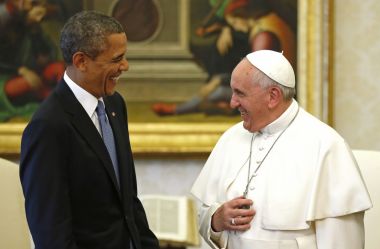Immigration, the economy and other issues Pope Francis may raise in his address to the US Congress

The US Congress should expect Pope Francis to come humbly but speak clearly on issues that affect the faithful, said Honduran Cardinal Oscar Rodriguez Maradiaga, one of the Pope's top advisers.
The Cardinal, who was addressing an audience in Georgetown University, said the Pope's first visit to the US in the fall will be a memorable one as he is set to address a joint meeting of the House and Senate at Capitol Hill.
Maradiaga promised that the Pope will not shy away from issues ranging from immigration, economy, environment, partisanship, families and the importance of dialogue, Religion News Service reported.
According to the Cardinal, the Pope is expected to underscore the importance of opening doors as opposed to building walls against immigrants.
The Pope has earlier expressed concern about the number of migrants who die trying to cross the border to Arizona or Texas and wanted to draw attention to the issue by wanting to enter the US through the Mexican border. Unfortunately, his schedule does not allow for this to happen.
The Pontiff is also expected to tackle economic inequalities that he feels favour the rich and burden the family.
"The (free) market economy is not complete. We need a social market economy. This is the big contribution of the Catholic faith to the system — to try to have this social component that will bring more justice to the system. It is not fair that a system that is producing so much richness could walk side by side with so much poverty," said the Cardinal.
With the expected release of the Pope's encyclical on climate change, Maradiaga said it was likely he would raise the issue before the US's political leaders.
"Do not expect statistics or numbers or theories in the encyclical. He will go directly to the responsibility of all the baptised, especially with creation. Because all of us have responsibility," he said.
The Pope, he said, may call on the faithful to reassess their priorities in relation to partisanship as they may be putting their identities as Democrats or Republicans first before their faith.
He is also expected to promote the concept of dialogue before ideology, especially among US leaders.
"One of the conditions for a true dialogue is to have peace in your soul, peace in your personality, to be persons of peace. But when you are in the trenches, trying to defend ideologies, you're not capable of a true dialogue," Maradiaga said.
"Even the congresspeople can listen to other voices, to counsels, to advisers. It's a human attitude that we have to develop. The one who receives advice commits less errors and is not mistaken. The one who does not like to listen to advice will have a lot of trouble. So I think the Congress will receive very well the advice (of the pope) — even if there are some things that will not be comfortable," he added.











